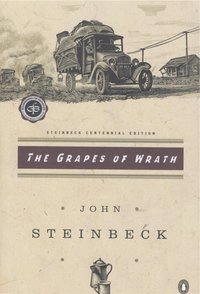The Grapes of Wrath
The Grapes of Wrath is a work of fiction written by John Steinbeck and published in 1939. The novel won the Pulitzer Prize in 1940 and it is frequently read in American high school and college literature classes. more...
A celebrated Hollywood film version was made in 1940, starring Henry Fonda and directed by John Ford.
Set in the Great Depression, the popular proletarian novel, in which descriptive, narrative, and philosophical passages succeed one another, tells the story of a family of sharecroppers, the Joads — 'Okie' farmers driven from their land by drought and the Dust Bowl, and forced to endure the hardships of migrant workers moving West. Note the similarity to the name Job (pronounced like "Jobe"), a man from the Old Testament that suffered greatly when tested by God, but remained faithful. The novel details the nearly hopeless situation of the downtrodden American farmer in the years of the Great Depression, and emphasizes cooperative solutions to the social problems brought about by industrialization.
Steinbeck experienced a rough time coming up with a title for the epic. "The Grapes of Wrath", suggested by his wife, Carol Steinbeck, deemed more suitable than any of the names John himself could come up with. The title is a reference to the Battle Hymn of the Republic, by Julia Ward Howe:
"Mine eyes have seen the glory of the coming of the Lord,
He has trampled out the vintage where the Grapes of Wrath are stored,
He has loosed the fateful lightning of his terrible, swift sword,
His Truth is marching on!"
This phrase originally comes from a passage from the Book of Revelation: "And the angel thrust in his sickle into the earth, and gathered the vine of the earth, and cast it into the great winepress of the wrath of God" (14:19).
Steinbeck wrote this book, along with Of Mice and Men, in what is now Monte Sereno, California, in his home at 16250 Greenwood Lane. When he was awarded the Nobel Prize in Literature (1962), the Swedish Academy called the book "an epic chronicle".
Plot summary
Tom Joad is paroled from prison after serving time for manslaughter, and returns to find his parents' farm deserted. Finding his family nearby, he discovers that they are planning to leave for California. Like other Oklahoma farmers, they have seen their crops ruined by the Dust Bowl. Eastern banks and corporate farmers are repossessing the land, and the Joads have little choice but to look for work in the orchards and fields out west.
They are joined by a former preacher, named Casy, and a couple they meet on the road.
En route to California, they discover the roads are choked with thousands of similarly-situated refugees, and that money is tight. They begin to suspect California may not be the answer to their problems. The elderly Joad grandparents, symbols of the old ways, die on the road to California.
Read more at Wikipedia.org



